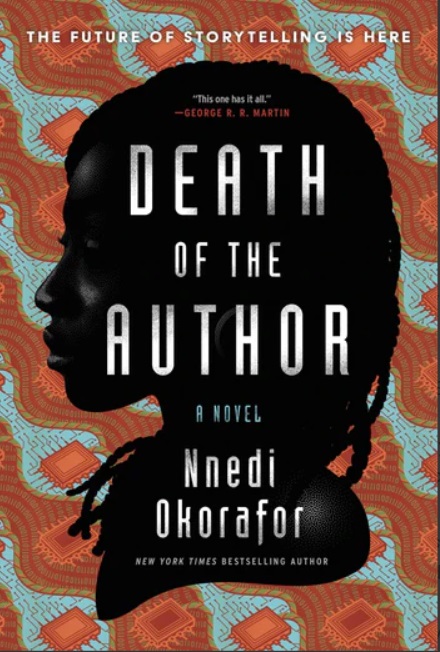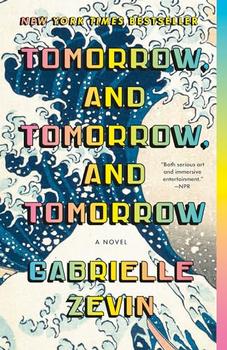Summary | Excerpt | Reviews | Beyond the book | Read-Alikes | Genres & Themes | Author Bio

A Novel
by Nnedi OkoraforZelu is a frustrated writer, annoyed by her self-important students and the adjunct teaching load that prevents her from completing her own literary novel. When an outburst in the classroom results in her dismissal from the Chicago university where she teaches, she embarks on a new and surprising writing project: a science fiction novel set on a post-apocalyptic Earth.
In that novel, eventually titled Rusted Robots (and included in excerpts that alternate with the narrative focused on Zelu), a robot named Ankara navigates a Lagos devoid of humans. There, those like her (humanoid robots known as "Humes") are at odds with the AIs (known as "Ghosts") who exist as formless entities and view the Humes, with their fragile, human-made, rusted-out bodies and their allegiance to human stories, as clunky and unnecessary. When Ankara learns a piece of information with devastating implications for the planet, she must negotiate a relationship not only with the world's last remaining human but also with one of those formless Ghosts, Ijele, who takes up residence in her circuitry.
If the concept of Rusted Robots intrigues you, you're not alone—Zelu's experiment in science fiction writing eventually lands her a massively lucrative book deal, along with a film adaptation of the novel, which becomes an instant bestseller and immediately catapults her into life as a world-famous author. Zelu's success creates many new opportunities, which lead to conflict with her overprotective Nigerian American family.
Zelu has used a wheelchair ever since a childhood fall paralyzed her from the waist down. Once, before her accident, she was fearless and dreamed of being an astronaut; since then, however, she has been viewed as fragile and vulnerable by her parents and siblings, who have taken on roles as protectors. When a leading researcher at MIT offers her a chance to walk again courtesy of his newly designed robotic limbs, Zelu is entranced by the possibility, although her siblings remain skeptical and disapproving of her desire for this different kind of bodily independence.
Zelu's story unfolds over years, during which time other opportunities—and other dangers—arise. As readers immerse themselves in both Zelu's and Ankara's journeys, they will undoubtedly become invested in both—and be blown away by the final twist that brings these two converging narratives a new and surprising unity.
Death of the Author is a novel full of possible avenues for discussion. There's its unusual structure, which includes not only the novel-within-a-novel (see Beyond the Book) but a series of interviews with Zelu's friends, lovers, and family members providing their own takes on events. Although largely taking place in Zelu's hometown of Chicago, Okorafor's novel is at its heart an African story, not only in Rusted Robots' Nigerian setting but also in Zelu's family dynamics, informed in large part by her immigrant parents, who come from different Nigerian ethnic groups and wildly different experiences of status and class. The question of what it means to live as an embodied person in the world is richly explored, both in the figure of Ankara the Hume and in Zelu's attitudes towards her physical disability. And this question is emotionally resonant, especially as it affects the bittersweet relationship between Ankara and Ijele, which, perhaps surprisingly, results in some of the novel's most affecting moments.
Finally, Death of the Author is, despite its title, a beautiful and affirming tale of the power of human stories, one that will certainly resonate with readers who have felt this power in their own lives. One character in Rusted Robots remarks near the novel's end, having heard a new story for the first time, "I feel satisfied, but also not. It reminds me of myself, but it is not about me. I feel like I've met those I've never met. I'm thinking things I never thought before. I have many questions." Readers—both those who already enjoy science fiction and those who might surprise themselves by being drawn in here—may find themselves thinking all these things and more over the course of Okorafor's stunning novel.
![]() This review
first ran in the January 15, 2025
issue of BookBrowse Recommends.
This review
first ran in the January 15, 2025
issue of BookBrowse Recommends.

If you liked Death of the Author, try these:

by Megan Giddings
Published 2025
From the award-winning, critically-acclaimed author of Lakewood and The Women Could Fly, a dazzling novel about two brilliant sisters and what happens to their undeniable bond when a mysterious and possibly perilous new world beckons.

Tomorrow, and Tomorrow, and Tomorrow
by Gabrielle Zevin
Published 2024
In this exhilarating novel by the best-selling author of The Storied Life of A. J. Fikry two friends - often in love, but never lovers - come together as creative partners in the world of video game design, where success brings them fame, joy, tragedy, duplicity, and, ultimately, a kind of immortality.
A classic is a book that has never finished saying what it has to say
Click Here to find out who said this, as well as discovering other famous literary quotes!
Your guide toexceptional books
BookBrowse seeks out and recommends the best in contemporary fiction and nonfiction—books that not only engage and entertain but also deepen our understanding of ourselves and the world around us.